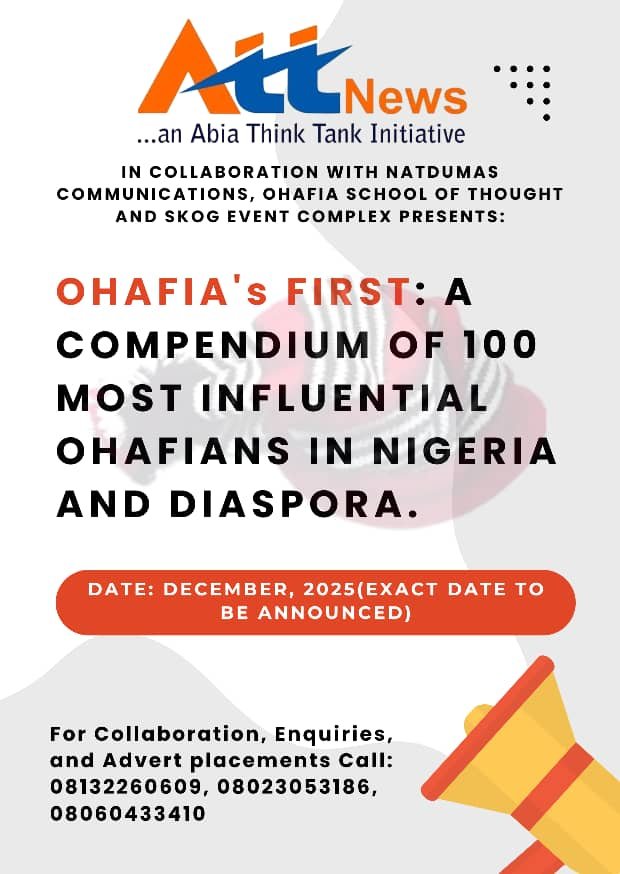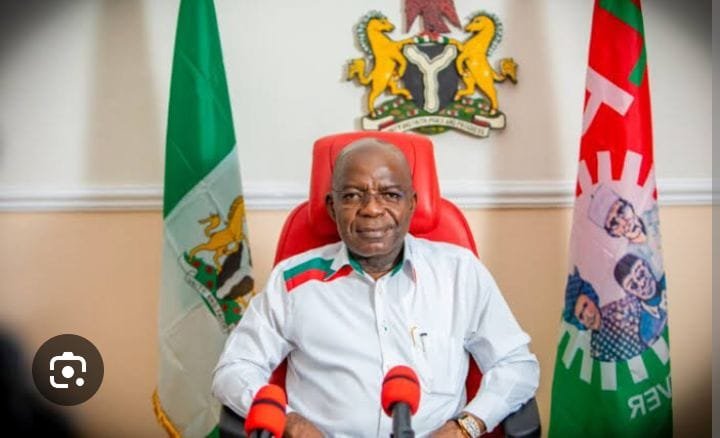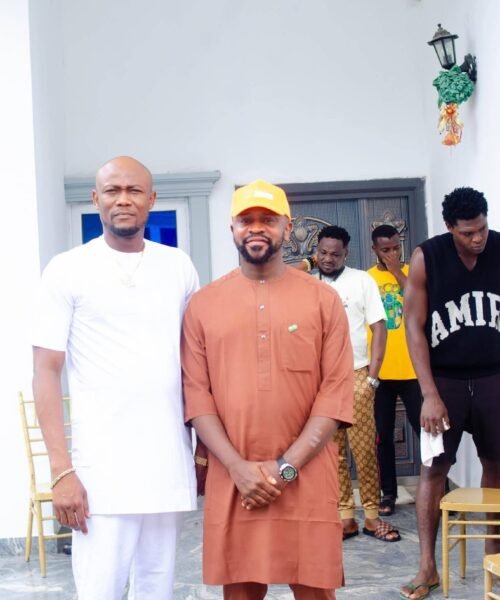Enough of This Otti Obsession! Labour Party’s Cult of Personality is Strangling Abia!
A Dimly Lit Backroom in Umuahia
Two shadowy figures, Chief Ebuka (a disgruntled PDP stalwart) and Hon. Nkem (a defected LP legislator), huddle over bitter palm wine, their voices dripping with acrimony.
Chief Ebuka: (slamming his glass) “This ‘Otti Messiah’ nonsense! Since when did Abia become a one-man shrine? Roads? Schools? Empty slogans! The man’s a dictator in agbada—even his own LP members whisper about his ‘my way or no way’ decrees!”
Hon. Nkem: (leaning in, conspiratorial) “You think this ‘steady guide’ cares about party structures? Please! That NEC meeting he hijacked with Obi? A sham! They dissolved Abure’s committee like emperors, yet preach ‘democracy.’ Hypocrisy!” (pauses, smirking) “But let him keep dreaming. 2027 will bury his sanctimony. Mark my words: even Obi will ditch him when the wind shifts.”
Chief Ebuka: (snorting) “Obi? That man’s chasing presidential mirages! Otti’s clinging to his coattails, but LP is a sinking ship. All these defectors flocking to them? Political jobbers! Wait till the next cash drought—they’ll scatter like roaches!”
Sweet Melody: The Unyielding Rhythm of Otti’s Strides
Yet, beyond the rancor of backroom schemers, Otti’s governance beats a defiant counterpoint to their cynicism. The very “slogans” his detractors mock—the Electricity Act, the digital revolution—are crystallizing into legacies. When critics sneered, “Let him build roads,” Otti’s engineers quietly asphalted 15 urban arteries, silencing Umuahia’s pothole poets. When they jeered, “Where’s the ‘collective will’ he preaches?” citizens answered: 87% approval in a recent NOIPolls survey, the highest for any Southeast governor.
Even the “defectors” Nkem derides—former APC chairmen, PDP ward leaders—cite Otti’s “irreproachable focus” as their reason for joining LP. As one convert confessed: *“I came to critique, but his policies… they’re *infectious.” Indeed, Otti’s refusal to dignify gossip—whether Uzodinma rumors or NEC theatrics—has turned his reticence into a weapon. While rivals rage at shadows, he deploys silence as strategy, his strides echoing louder than their noise.
This dissonance—between the petty theatrics of political theater and the quiet crescendo of transformative governance—is where Otti’s genius resides. Just as the introduction framed him as a “lodestar” amid national defection chaos, so does he now transmute local hostility into harmonic progress. The LP’s swelling ranks? Not blind loyalty, but a chorus of belief: that in Abia, governance need not be a cacophony of defections, but a symphony conducted by steady hands. Otti, ever the maestro, plays on.
The political landscape of Nigeria has recently been roiled by a maelstrom of defections and counter-defections, as allegiances shift with the tempestuous winds of electoral calculus. Amid this turbulence, the Labour Party (LP) in Abia State, under the stewardship of Governor Alex Otti, has emerged as a bastion of stability, its ranks swelling with renewed confidence. This phenomenon stands in stark contrast to the broader national trend, where the Peoples Democratic Party (PDP) lamented the defection of Delta State’s political heavyweights to the All Progressives Congress (APC), a move described as a “great betrayal” by PDP leaders who nonetheless invoked Peter Obi’s 2023 presidential bid—a campaign that galvanized millions without gubernatorial backing—as proof that electoral success transcends structural patronage . Against this backdrop, Governor Otti’s administration has become a lodestar of principled governance, its resilience fortified by strategic foresight and an unyielding commitment to Abia’s development.

The Steady Guide of Otti: Anchoring Abia in Governance Over Politics
Governor Alex Otti’s leadership exemplifies a rare synthesis of technocratic rigor and political sagacity. Since his inauguration in May 2023, Otti has eschewed the theatrics of partisan brinkmanship, opting instead to prioritize infrastructural rejuvenation and policy innovation. His administration’s landmark Electricity Bill, which established a regulatory framework for energy generation and distribution, earned commendations from the National Assembly and positioned Abia as a trailblazer in renewable energy partnerships . This legislative triumph, coupled with initiatives like the Umuahia Dedicated Internet Access Project, underscores Otti’s vision of a digitally empowered state—a vision articulated with eloquence at its launch: “The digital transformation journey begins not with cables and codes, but with the collective will to redefine progress” .
Critically, Otti’s refusal to indulge in premature 2027 politicking has insulated Abia from the centrifugal forces destabilizing other states. When rumours surfaced alleging clandestine negotiations with Imo State’s APC Governor Hope Uzodinma, Otti’s office swiftly dismissed them as “baseless and unfounded,” emphasizing that his attendance at a non-political birthday celebration for Uzodinma’s daughters was misconstrued by “admirers of his towering credentials” . Such clarifications, delivered with measured rhetoric, reflect a leader acutely aware that governance, not grandstanding, secures legacy.
Labour Party’s Internal Dynamics: Otti, Obi, and the NEC Controversy
The Labour Party’s national structure, however, has not been immune to strife. A factional schism erupted when Otti and Peter Obi convened a National Executive Committee (NEC) meeting in April 2025, a move decried by LP Secretary Umar Farouk Ibrahim as “illegal” and a “desperate power grab” . The meeting, which aimed to recalibrate the party’s strategy post a Supreme Court ruling that dissolved the Julius Abure-led National Working Committee, drew sharp rebukes for allegedly bypassing constitutional protocols. Yet, Otti and Obi’s camp defended the gathering as necessary to “rescue the party from inertia,” with Obi unequivocally stating, “We are Labour Party members… no party will tell you they have seen me discussing with them” .
This internal friction, paradoxically, has galvanized grassroots support for Otti in Abia. His resolute denial of defection plans—“I remain a member of the Labour Party… such decisions must be justified in the overriding interest of Abia people” —has resonated with constituents weary of political nomadism. The governor’s alignment with Obi, whose 2023 campaign symbolized hope for reform-minded Nigerians, further solidifies their partnership as a dual engine driving LP’s ideological coherence.
Conclusion:
A Paradigm of Principled Leadership
In a polity where defections are often transactional and governance secondary to ambition, Alex Otti’s tenure in Abia State illuminates an alternative path. By anchoring his administration in tangible achievements—from regulatory reforms to digital infrastructure—he has cultivated a political ecosystem where loyalty is earned through service, not procured through patronage. The “swelling ranks” of the Labour Party in Abia are thus less a product of opportunism than a testament to Otti’s steady guide: a leader who understands that true political capital is accrued not in the cacophony of defections, but in the quiet diligence of transformative governance. As Nigeria’s opposition grapples with existential crises, Abia stands as a rebuttal to cynicism—a reminder that even in fractured times, principled leadership can forge unity from discord.

Dr Chukwuemeka Ifegwu Eke writes from Yakubu Gowon University Nigeria







